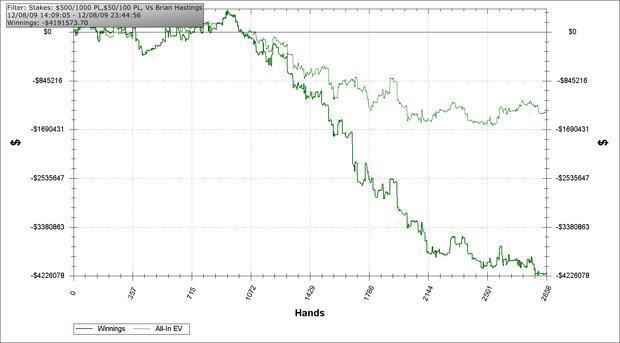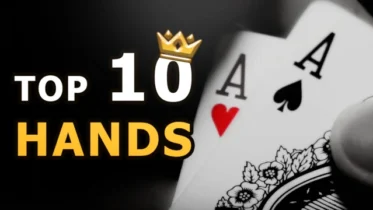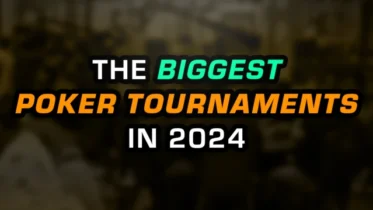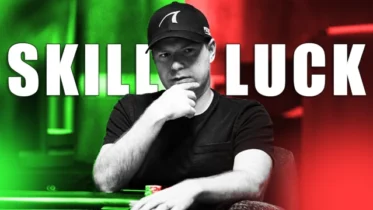“My biggest problem lately is how bad I’ve been running.”
“You’re not running bad. You’re playing bad,” I say, as I peel through their statistics.
As you can imagine, this conversation doesn’t always go swimmingly. Yet, it happens quite often when I’m coaching.
People will come to me hoping they can get some new plays to jolt their game.
They tell me they’re running bad. I then look under the hood and find they’re making some key mistakes.
What are those mistakes? The most common ones I see are these three:
Only 3-betting Premium Hands
Many guys come into the game hungry and looking for action. They see opponents who are opening too much, and they 3-bet them with all manner of goofy suited connectors, big cards, and small pairs. The loose opener then flats out of position, misses, and check/folds to a continuation bet.
You see a lot of younger guys play this way. They play hard. They play recklessly, but they play to win. They get some results off of this style.
Unfortunately, many guys then abandon this style. They get hired by a stable which doesn’t agree with their typical game. They get lectured by their friends for playing recklessly. They have a bad run, where their opponents keep picking up hands.
For whatever reason, you’ll see a lot of good aggressive players start flatting with everything but Queens, Kings, and Aces when they’re having a momentarily bad run. This just exacerbates and prolongs the run bad.
The problem with flatting all of your playable hands is that then you have to play all your pots multiway, since the big blind never folds now when getting such a great price. In multiway pots, someone is going to hit something, and they’re generally not going to fold. It’s much harder to bluff. You’re forced to make a hand.
Whenever you need to hit a hand to win, that’s calling gambling. You can do the same thing in Blackjack and Pai Gow.
What separates professionals from recreational players is the pots won when no one sees anything. No cards are needed to pull that off. Flatting preflop constantly removes your ability to capitalize like a professional.
Finally, it’s bad for you when you have premiums too. If you never 3-bet, it is going to be hard to get action when you finally do 3-bet your Aces.
Lack Of Continuation Betting
When a guy keeps running into hands, he sometimes will stop continuation betting. He’s angling to pick up cards or to try a delayed c-bet, but most of the time he’s just not cashing out his equity.
Most of the time, in heads-up pots, your opponent will have nothing on the flop. Unless there’s two cards 9 or higher, or unless the opponent is cold calling from a very early position with a tight range, it’s likely your adversary has missed the board the majority of the time.
You have to pick a bet that will fold high cards (it’s usually more than half pot) and fire.
If the guy is a little more clever (or playing a tighter range) you can bet smaller, as if you want action, and that might do the job.
But you need to get the other guy folding when he misses. That’s how you’ll pick up the most orphan pots without cards in No Limit Hold’em.
Alternatively, another leak you’ll see is when a guy flops a good pair or big hand, he keeps trying to trap. He’s had his big hands keep butting up against nothing, and he feels entitled to bigger pots. So, he keeps checking back, and letting his opponents catch cards to beat him. His slowplays rarely work. He gets frustrated, wondering why his results have changed, not realizing he’s allowed temporary results to affect his once solid game plan.
Too Much Double and Triple Barreling
When you continuation bet the flop, it’s usually because your opponent(s) have mostly high cards and they tend to be folding those high cards.
Therefore, when one or more of those opponents has gotten to the turn, they generally have pairs.
People SUCK at folding pairs on the turn and river. In every data set I have ever seen, the average guy just cannot fold.
Sometimes, a tilting player will forget this. They’ll have their AKo once again flop nothing, they’ll continuation bet and get called, then they’ll whine to themselves, “they can’t have it every time!” and then they’ll barrel off. Then, they’ll complain: “This dumbass wouldn’t fold second pair!”
Most guys are bad at folding. That’s why this game is so profitable. The real question is why are you trying to get low-to-mid stakes players to fold?



